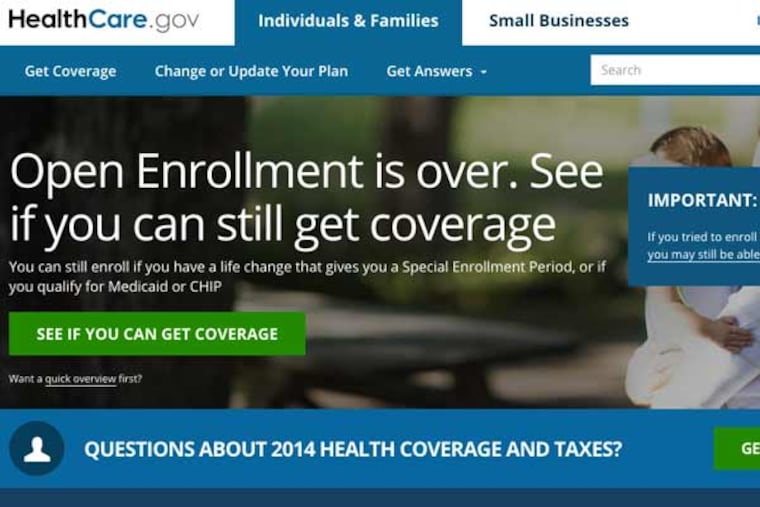Family experiences some ACA 'back-end' issues
When Peter and Alison Roithmayr logged onto healthcare.gov to buy insurance in December, they were impressed with the new, user-friendly Affordable Care Act website.

When Peter and Alison Roithmayr logged onto healthcare.gov to buy insurance in December, they were impressed with the new, user-friendly Affordable Care Act website.
The Malvern couple, who had bought a plan in 2013 on the error-prone website, noted how healthcare.gov had improved and "let you do a nice comparison" of plans.
Far more reliable, the site generally got good reviews - from consumers.
But by most accounts, the site's "back-end," where consumer data is transferred between the website and insurers, is still a mess. The same issues that gummed up data exchange during the first enrollment persist.
"That means there will be some cleaning up to do in terms of reconciling accounts and making sure payments are correct and the coverage dates are correct," Joel Ario, a managing director at Manatt Health Care Solutions and a former Pennsylvania insurance commissioner, said in November.
Like most buyers, the Roithmayrs knew nothing about the site's sickly back-end. But they were about to find out.
They reenrolled in December, but switched from an Independence Blue Cross silver PPO with a $1,589 monthly premium to a $987 Aetna bronze policy. The family did not qualify for a subsidy.
Before the family committed, their broker double-checked to make sure their doctors were in the network. They were, so the Roithmayrs signed on.
A month later, the couple's daughter Rebecca, 18, went to the doctor. The co-pay for the visit was $30, not the $15 quoted on the Aetna plan. It was, said Alison, 56, "the first warning light that something was wrong." A few days later, they got a letter from Aetna asking them to select their physicians.
"No matter how many ways we looked it up," Alison said, "we couldn't find them listed in there."
Neither could an Aetna representative. So Peter, 57, a business consultant, called the broker who verified online that the family's doctors were part of the plan. The Roithmayrs called their doctors only to discover that none was in the Aetna plan.
On Jan. 27, the couple called the marketplace. According to Alison, a representative didn't find the doctors listed on the site and said that, as it was the site's error, the family would get a special exception to change plans, even though enrollment was closed.
The family chose an Independence bronze plan that cost $1,053 a month and included their doctors.
"It was $100 more than the Aetna plan," Alison said, "but the most important thing was the doctors were in there."
She said the representative told her that the problem "could get resolved pretty fast," but that the process could take up to 30 days, starting Jan. 27. In any case, their new plan would take effect March 1 and be retroactive to Feb. 1.
The couple checked on their claim in early February only to find it stuck in limbo. Concerned that they had not paid a February premium, Peter called Independence.
In a statement, the company said that in cases like the Roithmayrs', it would do all it could "to get the best resolution possible" for members.
A company representative set up a conference call with the marketplace. The couple recounted their story to that person, who "basically said there is nothing they can do," Alison recalled.
The Roithmayrs asked the Independence representative what they should do about their February premium. The representative recommended sending a payment using the billing number from the 2014 silver plan - roughly $400 more a month than the 2015 Independence bronze plan - because healthcare.gov still hadn't canceled it. "We didn't want anybody coming back to us saying you haven't paid your premiums," said Peter.
A second three-way conference call in late February ended in the same stalemate. But by then, the Roithmayrs were worried about paying their March premium. The family had received identification cards for the bronze plan but still no billing number. So they used the silver plan number.
When a March 2 call to the marketplace found their case still unresolved, Peter said, "We threw in the towel."
On March 9, after calls from The Inquirer and Independence to the regional office for the Centers for Medicare and Medicaid Services, a federal representative called Peter Roithmayr. "We were granted a special enrollment period," he said, "retroactive to whenever we want."
The next day, Peter got a call from an Independence representative who told him that the family's bronze plan coverage had been activated retroactive to Feb. 1 and that the family would be credited the premium difference.
This article was written in partnership with Kaiser Health News, an editorially independent program of the Kaiser Family Foundation.